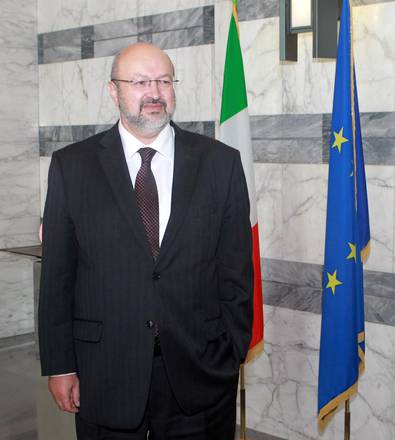OSCE across the board to avoid civil war in Ukraine
Big deployment of observers and mission, Zannier says
14 April, 19:58by Pierluigi Franco
(ANSA) - VIENNA - The situation in Ukraine is far from normal. Many regions of the country are reacting badly to the current crisis, with demonstrations in the eastern regions, in the industrial cities, where many people fear new risks with regard to economy and employment.
Some oligarchs have openly sided with Moscow, while others continue to push for a rapid movement towards the EU. A process which is likely - when heightened - to split the country. And this situation worries a lot the Organization for Security and Cooperation in Europe (OSCE), which is strengthening diplomatic actions on Ukraine. This overall picture was drawn - speaking to ANSA - by OSCE Secretary General Lamberto Zannier, who is certain that ''if Ukraine is not maintained as a bridge, as an entity that must find a balance between two fields, there is risk of fracture between two parts, one eastbound and the other westbound''. A risk that the OSCE wants to avoid because - Zannier does not hide it, ''these fractures indicate that there is a big risk of civil war'' and therefore ''it is important to find common ground , pushing points of agreement at the international level''. That's why the diplomatic action is currently so strong. And the OSCE has already taken action on many fronts. ''The most visible these days is a monitoring operation - said Zannier - . We have taken a decision, to which contributed Ukraine and Russia, too, in order to deploy international observers in the whole territory of Ukraine and we have identified ten operational bases in various regions, none of which in the Crimean Peninsula, and we have already employed 170 people and we are planning to increase the number. The mission represents all the countries of Europe, as well as Russia and the United States.
The mission's leader is a Turkish diplomat, with two deputies, one is British and the other one is Swiss''. But the OSCE's action focuses heavily on recovery of dialogue.
''We have started a project to facilitate dialogue - the secretary general says - sending a team of mediators in key regions, from east to west, ready to talk with local authorities and security officials in order to understand the problems and to put together all parts of the country within an inclusive process. I think this is the key challenge for Ukraine and for the international community''. An important dialogue, starting with the more than expected constitution, because - Zannier adds - there can not be a process of constitutional reform without this dialogue''.
A third activity which has been started by OSCE is the opening of an investigation into the violation of human rights , particularly with regard to incidents that have affected the country, and not only in Kiev . ''Several experts have already visited Ukraine - Zannier announced - and are now working on a report''. The fourth aspect pertains to the presidential elections in late May. ''We expect a massive observation and, therefore, we have arranged a team to prepare for elections - the secretary general explains -, since we want to see if there are improvements over previous elections, where significant faults were observed''.
Besides, even the military aspect is a delicate issue, with concerns over the Russian border. ''The OSCE has had in this period military observers in Ukraine - Zannier says - with a series of military inspectors, coming from Italy, too. They are located in the eastern part of the country at the present time and they are monitoring developments and they are also trying to figure out what happens along the Russian border, where there is a massive deployment of military forces, even if the Russians continue to give us reassurance''.
Moreover, the task of mediating is also focusing on the domestic institutions of Ukraine. The OSCE is launching this initiative for political dialogue to ''encourage a return to parliamentary debate, trying to bring to an end Maidan's period, more and more in the radicals' hands, by restoring the parliament's role''. (ANSA)














